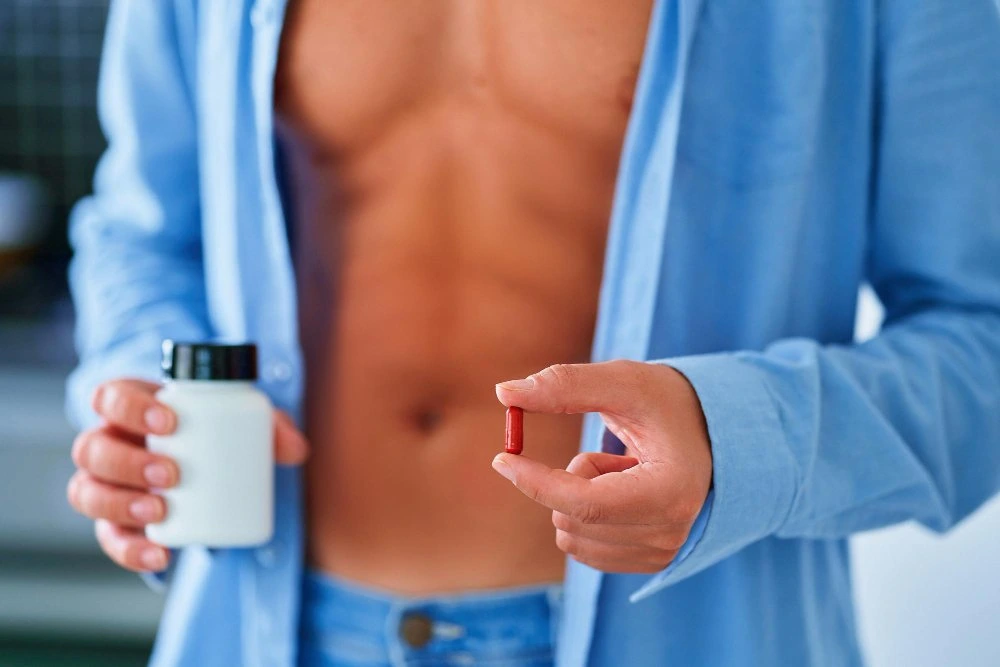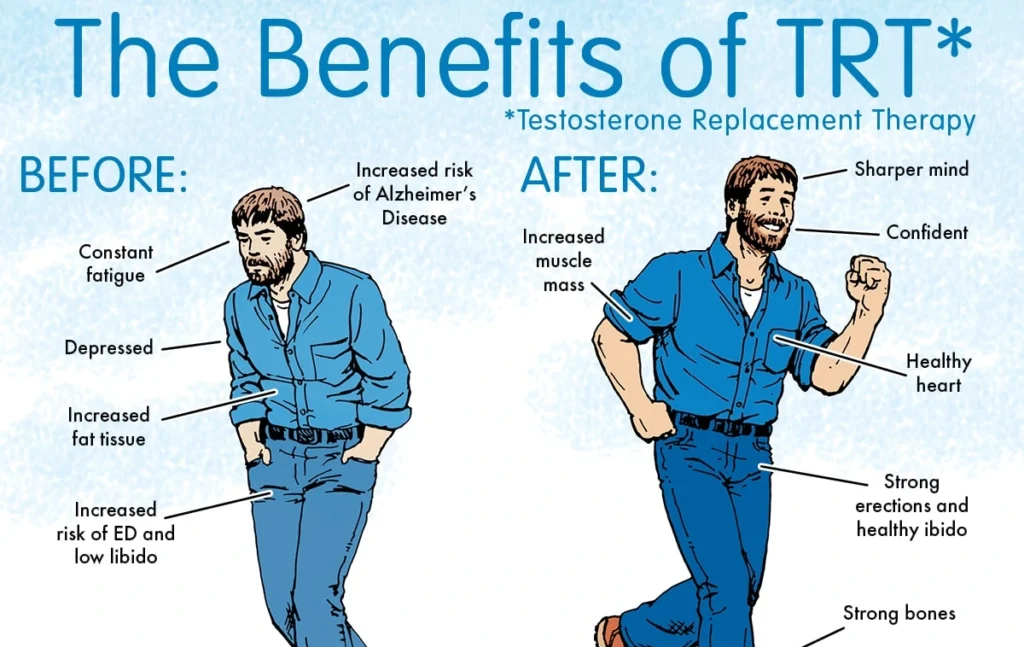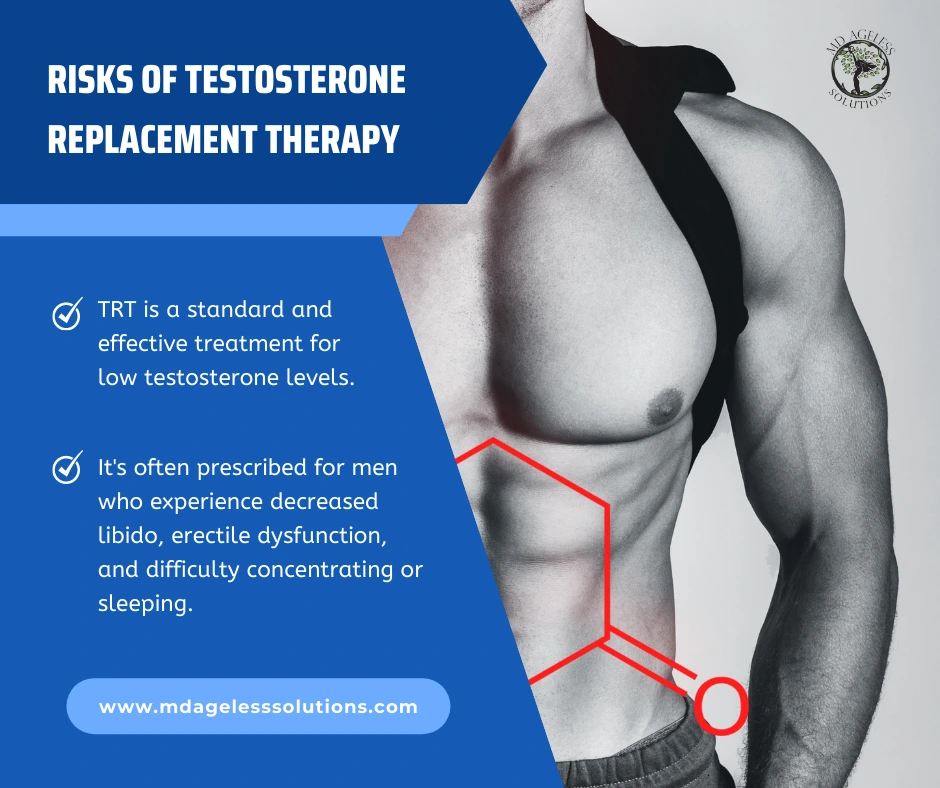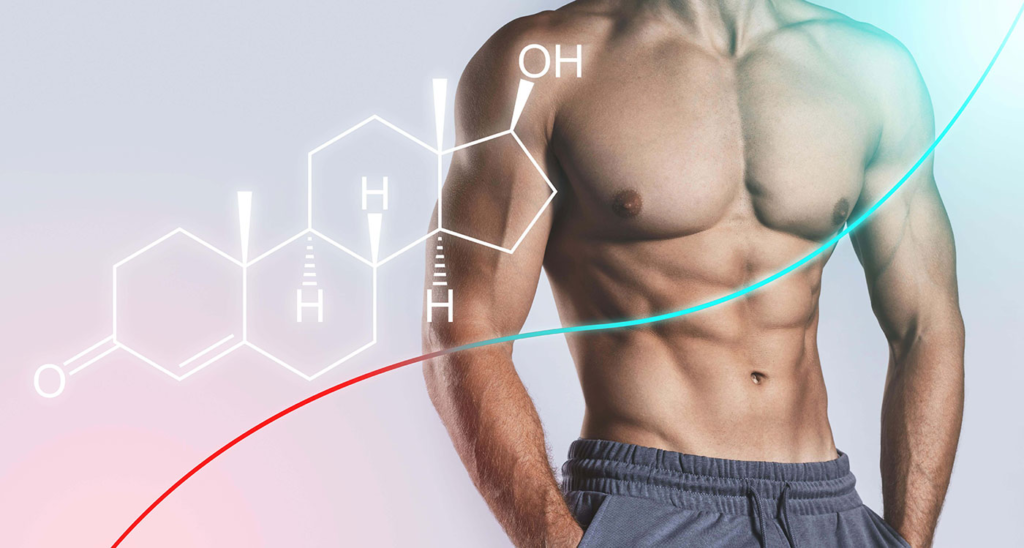Testosterone therapy is gaining popularity among men seeking to restore vitality as testosterone levels decline with age. While it can help improve mood, energy, and physical performance, it’s important to understand both the benefits and risks. This guide explores the perks of testosterone therapy for men includes boosting confidence and well-being, while also shedding light on the potential drawbacks, helping you make an informed decision about your health.
Common Reasons for Low Testosterone Levels in Men

- Aging: Testosterone levels naturally decline with age, typically starting around age 30.
- Obesity: Excess body fat, especially around the abdomen, can lead to lower testosterone levels.
- Chronic Illness: Conditions like diabetes, hypertension, and liver or kidney disease can affect hormone production.
- Stress: High levels of stress and prolonged cortisol production can interfere with testosterone levels.
- Sleep Disorders: Poor sleep quality or sleep apnea can disrupt testosterone production.
- Medications: Certain drugs, including opioids and steroids, may lower testosterone levels.
- Injuries or Infections: Damage to the testes or infections affecting the reproductive system can impact testosterone production.
- Genetic Factors: Some men have a genetic predisposition to lower testosterone levels, such as Klinefelter syndrome.
- Alcohol Consumption: Excessive drinking can interfere with hormone regulation and testosterone production.
- Pituitary Gland Disorders: Issues with the pituitary gland can affect the production of hormones that regulate testosterone.
These factors can contribute to low testosterone levels, impacting overall health and well-being.
Benefits of Testosterone Therapy:
- Increased Energy Levels: As testosterone naturally declines with age, many men experience fatigue and a decrease in overall energy. Testosterone therapy for men can help combat these symptoms, boosting energy levels and reducing feelings of exhaustion, allowing men to be more active and productive.
- Improved Mood: Low testosterone can contribute to mood swings, irritability, and even depression. Testosterone therapy can help stabilize mood, alleviate irritability, and improve overall emotional well-being. Many men report feeling less anxious and more optimistic after treatment.
- Enhanced Physical Performance: Testosterone plays a key role in building muscle and maintaining strength. Therapy can help increase muscle mass and improve strength, which can lead to better physical performance during workouts, sports, and daily activities. Men often feel stronger and more capable after beginning therapy.
- Better Libido: Low testosterone is a common cause of reduced libido or sexual dysfunction. Testosterone therapy can help restore sexual desire and performance, improving intimacy and relationships. Many men report a significant boost in their sexual drive and satisfaction after treatment.
- Increased Bone Density: Testosterone helps to maintain bone density by stimulating bone growth. Low testosterone can lead to weakened bones, increasing the risk of osteoporosis and fractures. Testosterone therapy for men can help improve bone density, reducing the likelihood of bone-related issues as men age.
- Cognitive Benefits: Testosterone has been linked to cognitive functions like memory, focus, and mental clarity. Some men undergoing testosterone therapy for men report better concentration, improved memory retention, and an overall sharper mind, particularly in older age when cognitive decline can occur.
How testosterone therapy increases Muscle Mass and Strength

Testosterone therapy increases muscle mass and strength through several key mechanisms:
- Enhanced Protein Synthesis: Testosterone plays a critical role in protein synthesis, which is the process by which the body repairs and builds muscle tissue. By increasing protein synthesis, testosterone therapy for men helps promote muscle growth, making it easier to gain muscle mass and improve strength.
- Increased Red Blood Cell Production: Testosterone stimulates the production of red blood cells, which are responsible for transporting oxygen to muscles. More oxygen in the muscles improves their endurance and performance during physical activity, allowing for longer and more intense workouts. This can lead to muscle growth and strength improvements over time.
- Boosted Nitrogen Retention: Testosterone therapy for men can increase nitrogen retention in the muscles. Nitrogen is an essential element of amino acids, which are the building blocks of muscle. A positive nitrogen balance (more nitrogen in the muscles than is being lost) is a key factor in muscle growth, as it indicates the body is in an anabolic state, promoting muscle repair and growth.
- Increased Testosterone Receptors in Muscle Tissue: Testosterone binds to androgen receptors in muscle cells, signaling them to grow and repair. With therapy, the number of receptors in the muscles can increase, making muscle tissue more responsive to the effects of testosterone and allowing for more efficient muscle-building processes.
- Reduction in Fat Mass: Testosterone therapy for men can help reduce excess body fat, particularly abdominal fat. Lower body fat percentages allow muscle definition to become more noticeable and help muscles appear more toned and stronger. Additionally, less fat means less resistance to muscle growth, enabling better physical performance.
- Enhanced Strength and Recovery: Testosterone therapy may improve strength by promoting the production of growth factors like insulin-like growth factor (IGF-1). These factors contribute to muscle recovery, repair, and growth, helping individuals recover faster from exercise and build muscle more effectively.
By increasing muscle mass, strength, and overall workout performance, testosterone therapy helps individuals build a leaner, stronger physique, especially when combined with regular exercise and proper nutrition.
How it Improves Sex Drive and Performance
Testosterone therapy for men can significantly improve sex drive (libido) and sexual performance by directly addressing the effects of low testosterone levels on sexual function. Here’s how it works:
- Restores Testosterone Levels: Testosterone is the primary hormone responsible for regulating sexual desire in men. Low testosterone levels can lead to a noticeable decrease in libido, making men feel less interested in sex. Testosterone therapy for men helps restore levels to a more youthful range, directly boosting sexual desire and interest.
- Increases Sexual Stimulation: Adequate levels of testosterone enhance the body’s response to sexual stimuli, both physical and psychological. This heightened sensitivity can lead to a more intense sexual experience and a greater sense of arousal, as testosterone is vital for normal sexual response.
- Improves Erectile Function: Testosterone plays an important role in erectile function. Low testosterone can contribute to erectile dysfunction (ED) by reducing the body’s ability to achieve or maintain an erection. Testosterone therapy for men helps improve blood flow to the penis and supports the mechanisms involved in achieving an erection. This can lead to better erectile function, especially when ED is related to low testosterone levels.
- Supports Healthy Sperm Production: Testosterone is also essential for sperm production. While testosterone therapy for men may not be a direct treatment for infertility, restoring normal testosterone levels can help improve overall reproductive health. This can increase the chances of conception in some men, as well as boost sexual vitality.
- Boosts Confidence and Mood: Low testosterone levels can often lead to feelings of anxiety, depression, or self-consciousness, which may impact sexual performance. By improving mood, energy, and overall well-being, testosterone therapy for men can help restore confidence in the bedroom, reducing performance anxiety and leading to a more satisfying sexual experience.
- Enhances Sexual Stamina: Testosterone therapy for men can improve stamina by increasing muscle mass and energy levels. This helps men feel more physically capable and energized during sexual activity, which can lead to enhanced sexual performance and endurance.
By restoring testosterone to optimal levels, therapy directly addresses several factors that can interfere with sex drive and sexual performance, making it an effective treatment for men experiencing low libido or sexual dysfunction due to low testosterone.
How it Boosts Energy and Mood

Testosterone therapy for men can significantly boost energy levels and improve mood by addressing the underlying causes of fatigue, irritability, and depression associated with low testosterone.
1. Restores Hormonal Balance
- Testosterone’s Role in Energy: Testosterone is a vital hormone that helps regulate various bodily functions, including energy production. When testosterone levels are low, many men experience fatigue and a lack of motivation. By restoring testosterone to more youthful levels, testosterone therapy for men helps bring back the energy needed for daily activities, making men feel more alert, focused, and active.
- Improves Sleep Quality: Testosterone plays a role in sleep regulation, and low levels can contribute to sleep disturbances like insomnia or poor-quality sleep. As testosterone therapy for men restores normal levels, men often experience improved sleep, which in turn boosts energy during the day.
2. Enhanced Physical Stamina
- Testosterone helps increase red blood cell production, which is responsible for transporting oxygen throughout the body. Higher red blood cell count allows muscles to get more oxygen during physical exertion, which leads to increased endurance. With increased stamina, men feel more energized during both physical activities and regular tasks, leading to greater overall vitality.
3. Improved Mood and Reduced Irritability
- Testosterone and Mental Health: Low testosterone levels are often linked to mood disorders like depression, anxiety, and irritability. By restoring testosterone levels, therapy can have a positive impact on mental health. Many men experience improvements in mood, reduced anxiety, and an overall sense of well-being after undergoing testosterone therapy.
- Decreased Depression Symptoms: Studies have shown that men with low testosterone levels are at higher risk for experiencing depressive symptoms. Testosterone therapy for men has been linked to a decrease in these symptoms, helping men feel more optimistic, positive, and less overwhelmed.
4. Increased Motivation and Mental Clarity
- Low testosterone can lead to a lack of motivation, mental fatigue, and difficulty concentrating. Restoring testosterone levels with therapy can enhance mental clarity and focus. Men often report feeling more motivated and mentally sharper after treatment, which can improve both work performance and personal life.
5. Improved Confidence
- Low testosterone can affect a man’s sense of self-esteem and confidence, as it can lead to changes in physical appearance (such as reduced muscle mass and increased body fat) and emotional well-being. Testosterone therapy for men can help reverse some of these effects by increasing muscle mass, reducing fat, and boosting mood, which in turn improves confidence and a sense of personal well-being.
Risks of Testosterone Therapy:

While testosterone therapy for men offers various benefits, it can also have potential side effects, especially when not monitored properly or used in excess. Here are some common and serious side effects of testosterone therapy:
Potential Side Effects
While testosterone therapy offers various benefits, it can also have potential side effects, especially when not monitored properly or used in excess. Here are some common and serious side effects of testosterone therapy:
1. Increased Red Blood Cell Count (Polycythemia)
- Testosterone therapy for men can stimulate the production of red blood cells, which may lead to polycythemia, a condition where the blood becomes too thick. This increases the risk of blood clots, heart attack, or stroke. Regular blood tests are needed to monitor red blood cell levels.
2. Sleep Apnea
- Testosterone therapy for men can exacerbate sleep apnea in some men. Sleep apnea is a condition where breathing stops temporarily during sleep, leading to poor sleep quality, fatigue, and other health issues. Men with a history of sleep apnea may need to be monitored closely while on testosterone therapy.
3. Acne and Oily Skin
- Testosterone can increase the production of sebum, the skin’s natural oil. As a result, acne and oily skin can occur, particularly in individuals prone to these issues. This may be more noticeable in younger individuals or those using higher doses of testosterone.
4. Breast Enlargement (Gynecomastia)
- Some men may experience the enlargement of breast tissue (gynecomastia) as a result of hormonal changes caused by testosterone therapy. This occurs when testosterone is converted into estrogen, a female hormone, in the body. It can cause tenderness or discomfort in the breast area.
5. Hair Loss
- Testosterone therapy can accelerate male pattern baldness in individuals who are genetically predisposed to it. The therapy can cause hair thinning on the scalp or increased body hair growth, which might be undesirable for some men.
Testosterone therapy should always be administered under the guidance of a healthcare provider to ensure its safety and efficacy.
Interactions with Other Medications
Testosterone therapy for men can interact with various medications, potentially altering the effectiveness of either the testosterone treatment or the other medication. Here are some common medications and substances that may interact with testosterone therapy:
1. Corticosteroids (e.g., prednisone)
- Effect: Corticosteroids can increase the risk of fluid retention and swelling when used with testosterone therapy. This combination can also exacerbate the risk of blood clots or other cardiovascular issues.
- Precaution: Careful monitoring is necessary for signs of swelling or fluid retention, especially in the ankles, feet, or hands.
2. Anticoagulants (e.g., warfarin)
- Effect: Testosterone therapy for men can affect the blood’s ability to clot, especially when taken with anticoagulants. This could increase the risk of bleeding or make blood clotting less effective.
- Precaution: Regular blood tests are necessary to monitor blood clotting function, as testosterone therapy for men may alter the effectiveness of anticoagulant medications.
3. Insulin or Other Diabetes Medications
- Effect: Testosterone therapy for men can impact blood sugar levels and insulin sensitivity. It may either increase or decrease insulin resistance in some individuals, affecting the management of diabetes.
- Precaution: Diabetic patients using insulin or oral hypoglycemic drugs should closely monitor their blood sugar levels while on testosterone therapy. Adjustments to diabetes medications may be needed.
4. Opioids (e.g., morphine, oxycodone)
- Effect: Opioid medications can lower testosterone levels over time, and when combined with testosterone therapy, it can potentially create hormonal imbalances. This interaction may also worsen the symptoms of low testosterone, such as fatigue or low libido.
- Precaution: Opioid use should be closely monitored when undergoing testosterone therapy for men, and healthcare providers may adjust doses as needed.
5. Barbiturates (e.g., phenobarbital)
- Effect: Barbiturates can accelerate the metabolism of testosterone, reducing its effectiveness. This could result in a diminished therapeutic effect of testosterone therapy for men.
- Precaution: The dose of testosterone may need to be adjusted if taken alongside barbiturates.
6. Medications Affecting Liver Function (e.g., antifungals, anticonvulsants)
- Effect: Certain medications that affect liver enzymes can alter the way testosterone is metabolized in the liver. This can either enhance or reduce the effectiveness of testosterone therapy for men.
- Precaution: Regular liver function tests are recommended for men taking testosterone with medications that influence liver enzymes.
Best Candidates for Testosterone Therapy

Testosterone therapy for men can be a game-changer for many men, but it’s not for everyone. The best candidates for testosterone therapy typically show clear signs of low testosterone levels, such as fatigue, decreased libido, or reduced muscle mass.
Men aged 30 and older often experience natural declines in hormone production. Those with symptoms affecting their quality of life should consider discussing options with a healthcare provider.
Additionally, individuals diagnosed with conditions like hypogonadism might benefit significantly from treatment. This condition results in insufficient testosterone due to issues within the testes or pituitary gland.
It’s crucial that potential candidates undergo thorough blood tests to confirm low levels before starting therapy. A tailored approach ensures safety and effectiveness while minimizing risks associated with treatment.
Natural Ways to Increase Testosterone Levels in men
Increasing testosterone levels naturally is possible through lifestyle changes, diet, exercise, and proper sleep. Here are several effective strategies:
1. Exercise Regularly (Especially Strength Training)
- Strength Training: Weightlifting and resistance exercises are one of the most effective ways to boost testosterone. These exercises stimulate muscle growth and can increase testosterone production.
- High-Intensity Interval Training (HIIT): Short bursts of high-intensity exercise followed by rest periods have been shown to elevate testosterone levels and improve overall health.
2. Get Enough Sleep
- Quality Sleep: Testosterone production is closely linked to sleep quality. Aiming for 7-9 hours of uninterrupted sleep per night is crucial for maintaining healthy testosterone levels. Poor sleep can significantly lower testosterone, particularly when sleep is inconsistent or too short.
- Sleep Hygiene: Avoid caffeine or electronic devices before bedtime and try to maintain a consistent sleep schedule to optimize rest.
3. Eat a Balanced Diet
- Healthy Fats: Incorporate healthy fats like omega-3 fatty acids, which are found in fatty fish (salmon, mackerel), olive oil, and avocados. Healthy fats are essential for hormone production, including testosterone.
- Protein: Adequate protein intake helps maintain healthy testosterone levels by supporting muscle mass. Include lean meats, eggs, beans, and legumes in your diet.
- Zinc and Vitamin D: Both zinc (found in oysters, red meat, and pumpkin seeds) and vitamin D (from sunlight, fortified foods, and egg yolks) play vital roles in testosterone production. A deficiency in either of these nutrients can lead to lower testosterone levels.
4. Manage Stress and Cortisol Levels
- Reduce Stress: Chronic stress increases cortisol, a hormone that can lower testosterone levels. Finding ways to manage stress, such as meditation, mindfulness, deep breathing, or yoga, can help maintain a healthier balance between cortisol and testosterone.
- Relaxation Techniques: Engaging in activities like walking, reading, or spending time with loved ones can help reduce stress and improve testosterone levels.
5. Maintain a Healthy Weight
- Body Fat and Testosterone: High body fat, especially around the abdomen, is associated with lower testosterone levels. Reducing body fat through regular exercise, a healthy diet, and a balanced lifestyle can help boost testosterone.
- Avoid Crash Diets: While weight loss is important, extreme calorie restriction or crash diets can negatively affect testosterone. Aim for gradual, sustainable weight loss.
Conclusion
Testosterone therapy for men offers benefits like increased muscle mass, energy, and improved mood for men with low testosterone. However, it’s important to be aware of potential risks and side effects, as well as interactions with other medications. Consult with a healthcare professional before starting treatment and consider natural methods to boost testosterone. Each individual’s needs are unique, so carefully weigh the options to make an informed decision aligned with your health goals.

